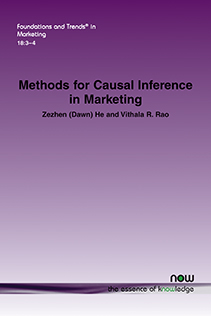Methods for Causal Inference in Marketing
By Zezhen (Dawn) He, Simon Business School, University of Rochester, USA, Zezhen.He@simon.rochester.edu | Vithala R. Rao, Johnson Graduate School of Management, Cornell University, USA, vrr2@cornell.edu
Abstract
Establishing causal relationships between the marketing variables under the control of a firm and outcome measures such as sales and profits is essential for the successful operation of a business. The goal is generally hindered by a lack of suitable experimental data owing to the costs and feasibility of conducting randomized experiments. Accordingly, researchers have employed observational and quasi-experimental data for causal inference. The evolutionary trajectory of causal inference is closely intertwined with advancements in business and technology, particularly as we enter the digital era characterized by big data and multichannel marketing.
Against this background, this monograph is a systematic review of recent developments in causal inference methods and their applications within the marketing field. For each causal inference method, five recently published academic papers in marketing research that employ these methods are discussed.
In addition, this monograph provides simplified code for developing simulated data (using Python) and hypothetical examples of data analysis (using Stata). This addition will enable marketing researchers to practice several methods of causal analysis.
Sections 1–5 elucidate the fundamental principles of causal inference. Subsequent sections (beginning from Section 6) delve into the details of a selection of papers that utilize various methods. These encompass: (i) well-established techniques, such as Differences-In-Differences, Instrumental Variable, Regression Discontinuity, Synthetic Control, and Propensity Score Methods, and (ii) emerging methodologies of Factor Model and Augmented Differences-In-Differences, Forward Differences-In-Differences, and Bayesian methods for causal inference. Further, this monograph reviews how machine learning methods enhance causal inference. This monograph includes several important and useful references not reviewed in the monograph. We expect this monograph to serve as a useful resource both to current and future researchers in marketing.
Methods for Causal Inference in Marketing
Methods for Causal Inference in Marketing is a systematic review of recent developments in causal inference methods and their applications within the marketing field. For each causal inference method, five recently published academic papers in marketing research that employ these methods are discussed. In addition, this monograph provides simplified code for developing simulated data (using Python) and hypothetical examples of data analysis (using Stata). This addition will enable marketing researchers to practice several methods of causal analysis. Sections 1-5 elucidate the fundamental principles of causal inference. Subsequent sections (beginning from Section 6) delve into the details of a selection of papers that utilize various methods. These encompass (i) well-established techniques, such as Differences-In-Differences, Instrumental Variable, Regression Discontinuity, Synthetic Control Method, and Propensity Score Method, and (ii) emerging methodologies of Factor Model and Augmented Differences-In-Differences, Forward Differences-In-Differences, and Bayesian methods for causal inference. Further, this monograph reviews how machine learning methods enhance causal inference and includes several important and useful references not reviewed. This monograph serves as a useful resource both to current and future researchers in marketing.

Replication Data | 1700000080_supp.zip (ZIP).
This file contains the data that is required to replicate the data on your own system.